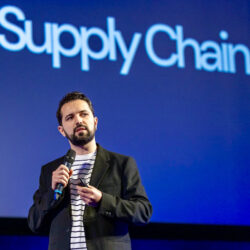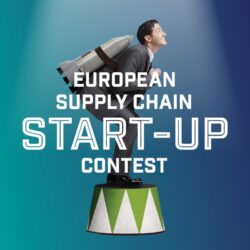Start-ups and scale-ups open people’s eyes at inNOWvate

In almost every supply chain, the same actions are performed day after day without question. The six young companies that were invited to pitch their solutions at the inNOWvate Supply Chain Event in the Dutch town of Ede on 11 May showed why it is so important to keep track of start-ups and scale-ups: they open our eyes to simpler, better or faster ways of doing things.
By Marcel te Lindert
Most online shops deactivate the ‘Order’ button when a product is out of stock. But why? Some customers might be willing to wait, as long as they know when they can expect the product to become available. That’s the thinking behind Fabrikatör, a Berlin-based start-up offering a platform for direct-to-consumer brands. By aligning their marketing activities with their purchasing activities, the companies can avoid generating too much demand when they have too little stock, or vice versa.
One of the features of Fabrikatör’s solution is the ability to sell products that are currently out of stock in the warehouse but are in the pipeline elsewhere in the supply chain. The platform tracks the arrival time of the products so that the retailer can indicate a reliable delivery time to consumers. “This enables us to generate 10% extra turnover for our customers every month,” stated Fabrikatör’s Bahadir Efeoglu (pictured) during the inNOWvate Supply Chain Event organized by Supply Chain Media.
Pitches at inNOWvate
The six start-ups and scale-ups that were invited to hold a three-minute pitch during inNOWvate each demonstrated why they were selected as finalists of the European Supply Chain Start-up and Scale-up Contest. They were united by their refreshing take on supply chain challenges, and presented innovative solutions that seem surprisingly simple in hindsight.
A prime example was RTI Blockchain, the Dutch-based company that ultimately won the scale-up contest for its use of blockchain technology to automate and improve the administrative activities relating to packaging and reusable transport items. This eliminates hassle for drivers in terms of having to note down how many pallets or roll containers they deliver and collect, plus there is no longer any need for Excel sheets to keep track of how many packaging items each supply chain partner has. And perhaps most importantly of all, there is no more capital wasted on buying new bins or crates because the old ones got lost in the system. Why didn’t someone come up with this idea sooner?!
ChatGPT in forecasting
Several other pitches evoked a similar ‘Eureka’ moment. Ventory won the start-up contest with its tool that responds to an ever-growing trend: holding inventory closer to customers, as ever more companies discover that a central warehouse does not enable them to respond to market demand quickly enough. But how can retailers keep a grip on all their inventory across stores, hubs and other locations? Ventory’s app makes it easy to monitor and manage those inventory points, leading to greater stock reliability in the supply chain.
Software vendor Garvis presented a tool that digitally captures demand planners’ knowledge and insights in order to improve forecasting. Notably, this Belgian scale-up has also integrated ChatGPT into its demand planning tool. Now, even a company’s digital dinosaurs can conjure up valuable information on their computer screen by typing in a straightforward question. And the answers that appear on the screen are formulated in clear and simple language, making it even easier for them to arrive at the right decisions.
Sustainability
One start-up and one scale-up presented solutions for supply chain sustainability. Even though this topic demands ever more attention, most companies still don’t have effective tools to address it. Therefore, it is a high-potential growth market, especially in view of the ongoing rise in sustainability-related legislation. One example is the European Union’s Corporate Sustainability Reporting Directive (CSRD), which makes detailed sustainability reporting mandatory for certain companies. But what can they do when the biggest sustainability headaches are elsewhere in the supply chain?
The platform developed by French-based scale-up Sweep allows companies to gather emissions data from suppliers and supports rapid identification of the problems and their possible solutions, such as by analysing the impact of switching to alternative suppliers. Meanwhile, the UK start-up Permutable AI deploys artificial intelligence to assess suppliers on many more aspects than just emissions, revealing which parts of the supply chain pose a risk.
During the course of this year’s inNOWvate Supply Chain Event, it became apparent that more start-ups and scale-ups have now discovered this growth market. Over the next few years, it will become clear which solutions actually make a difference.










